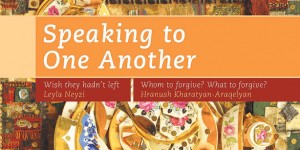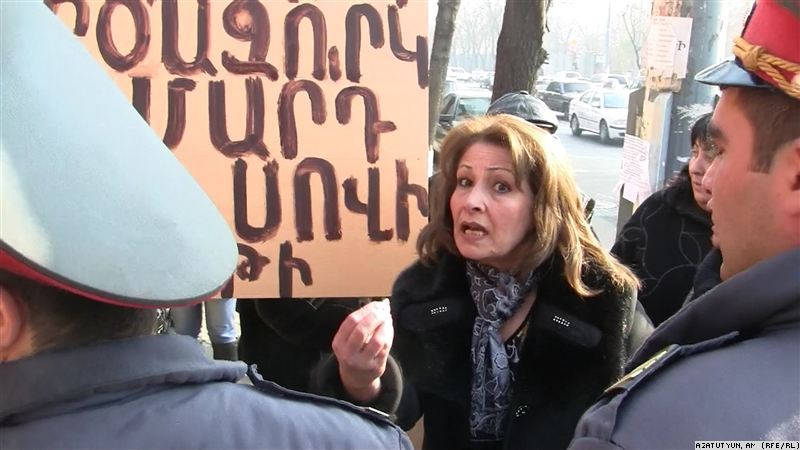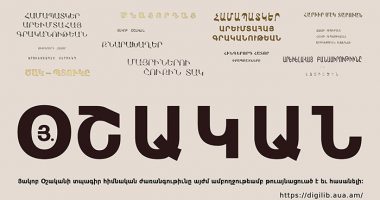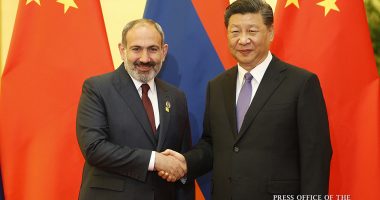

One recent example of such an effort came to the fore with the new book, “Speaking to One Another: Personal Memories of the Past in Armenia and Turkey.” The first part, “Wish they hadn’t left,” was written by Professor Leyla Neyzi from Sabanci University in Istanbul, while the second part, “Whom to forgive? What to forgive?” was written by Professor Hranush Kharatyan-Araqelyan from the Institute of Archaeology and Ethnology of the Armenian National Academy of Sciences in Yerevan.
The first story, titled “Wish they hadn’t left: The burden of Armenian memory in Turkey,” begins with: “One of our Turkish interviewees, in speaking about Armenians, made the statement quoted above: ‘Wish they hadn’t left.’ This phrase is significant as it signals a nostalgic view of the past, whereby a lost society of harmonious relations between Muslims and Christians is (re)imagined. This discourse, which romanticizes the past, also conveniently elides the tricky question of agency by implying that the sizeable population of Christians of this land ‘left’ of their own accord.”
The interviewee was Kamil, who was a student at the Gazi Mustafa Kemal Elementary School in the central Anatolian town of Aksehir in the early 1960s.
“Besides those who, like Kamil, are sorry about the ‘separation,’ there are also those who want to forget and hide the ‘unity.’ Kamil still encounters them, as he did in his childhood, and he still protests. When it is decided that an abandoned church is to be used as a theatre, the dust of the years must be removed: ‘When the church is being washed, the man wants to turn the hose on one of the walls. As the sprayed water hits the wall, the paintings, this and that, appear. They whitewashed those walls because it’s not to be known that the Armenians lived here. Imagine what sort of destruction this is.’ Kamil is happy about the restoration of the hamam, which he knew as gavurs’ hamam in his childhood, as much as he is unhappy about the whitewashed walls.”
In the second half of the book, a story from a relative of a survivor of 1915 haunts readers:
“My grandma did not rejoice in anything in her life. She died in pain and repeatedly said that it is payback for her sin: She left her small daughter on the road… I don’t know, it is a very sad story, in the middle of the road they couldn’t find food to feed. They had four children, this one was a baby girl, she cried all the time. A Turkish soldier was coming and hitting her all the time, saying ‘be quick, don’t lag behind.’ She told that her grandfather said: ‘Let us leave this child here on the road and go. At least we will be able to rescue the three boys… (The storyteller gets upset, silent, tries to collect his thoughts…) It took a long time for my grandma to die. She would open her eyes and say, ‘I suffer for that child that I left behind’.”
The book has been published in English, Turkish and Armenian.
Alin Ozinian, an Istanbul-based Turcologist who translated the book from Armenian to Turkish, said oral history work is an impressive way of preserving history.
“Oral history is maybe the most romantic way of preserving history. Those stories are very impressive,” she said, adding that the book will help people tell more of their stories, which are usually hidden.
The book underlines that there is now an opportunity for Armenians to visit Turkey. “People go and find the villages of their ancestors, sometimes also the house they lived in, important places their grandfathers told them about: the cemetery, church, sacred places, trees, forests.”
There is also an exhibition that opened on Dec. 17 in the Cezayir Exhibition Hall in Beyoglu that displays the memories of ordinary people in Armenia and Turkey about the intertwined past using their own words.
“Speaking to One Another: Personal Memories of the Past in Armenia and Turkey” – Book Aims to Start Dialogue Between Turks, Armenians
- No comments
- 3 minute read
The Positive Outcomes of the Brussels Meeting
By: K. KHODANIAN Last September, Azerbaijani troops invaded Artsakh, prompting over…
- MassisPost
- April 14, 2024
- No comments
- 2 minute read
It’s Not Armenia That Has Distanced Itself From Russia, but Rather the Other Way Around
By K. KHODANIAN Armenia and Russia are experiencing notable tensions in their…
- MassisPost
- April 7, 2024
- No comments
- 2 minute read
Stating the Obvious: Kigali Genocide Memorial and the Armenian Genocide
Gomidas Institute Initiates Campaign on Kigali Genocide Memorial and the Armenian…
- MassisPost
- April 7, 2024
- No comments
- 3 minute read
How an Armenian Family Helped in Building Modern Egypt
By ARUNANSH B. GOSWAMI Recently the author of this article was in…
- MassisPost
- April 5, 2024
- No comments
- 5 minute read









